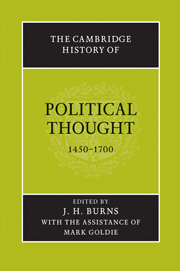Book contents
- Frontmatter
- Introduction
- I Renaissance and Counter-Renaissance
- 1 Humanism and political theory
- 2 Italian political thought, 1450–1530
- 3 Law
- 4 Transalpine humanism
- 5 Scholasticism: survival and revival
- II Religion, civil government, and the debate on constitutions
- III Absolutism and Revolution in the Seventeenth Century
- IV The end of Aristotelianism
- V Natural law and utility
- Conclusion
- Biographies
- Bibliography
- Index of names of persons
- Index of subjects
- References
1 - Humanism and political theory
from I - Renaissance and Counter-Renaissance
Published online by Cambridge University Press: 28 March 2008
- Frontmatter
- Introduction
- I Renaissance and Counter-Renaissance
- 1 Humanism and political theory
- 2 Italian political thought, 1450–1530
- 3 Law
- 4 Transalpine humanism
- 5 Scholasticism: survival and revival
- II Religion, civil government, and the debate on constitutions
- III Absolutism and Revolution in the Seventeenth Century
- IV The end of Aristotelianism
- V Natural law and utility
- Conclusion
- Biographies
- Bibliography
- Index of names of persons
- Index of subjects
- References
Summary
Scholarship and power: a problematic partnership
In 1599 the Habsburg archduke and his Infanta came to the university of Louvain to hear a humanist teach. The outstanding local scholar Justus Lipsius proved more than equal to this challenging task, as he explained to a friend in a characteristically immodest letter:
I had to perform in the School of Theology, after what they call a theological ‘Actus’. So I stood up and began to speak… after an extemporaneous introduction I explained a short text from Seneca's De clementia, beginning: ‘The prince's greatness is firmly founded if all know that he is at once above them and on their side etc’. I explained the text from Seneca, I say, and in it the task of princes, and finally I added a reflection on the happy result that would stem from this, that is that we Belgians would feel towards them the benevolence and loyalty we had always felt for our rulers. That's it. They heard me with such sympathy that the prince never took his eyes off me; he inclined towards me not just mentally but bodily. So did the other nobles present, and they in turn received the favour of the ambassador of the king of Spain, a scholar, and one who favours me, as you should know. The Infanta was there too. I leave you to imagine what – or if – she understood. Now you know what went on here – the unusual, or possibly unique, event of a female prince coming to these exercises. I, and other prudent men, may begin to cherish better hopes for the republic, since the princes are openly beginning to show themselves favourably disposed to their Belgians and their ways.
(Lipsius 1637, II. 454)- Type
- Chapter
- Information
- The Cambridge History of Political Thought 1450–1700 , pp. 7 - 29Publisher: Cambridge University PressPrint publication year: 1991
References
- 40
- Cited by



